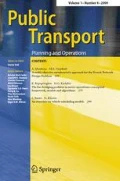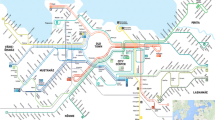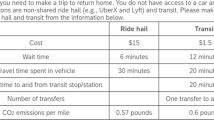Abstract
The paper presents the results of an empirical investigation of the influence of transit pass ownership on daily transit service usage behavior under a flat fare system. The transit system of the City of Toronto is investigated to evaluate the factors that influence the choice of owning a transit pass and at the same time whether or not a pass ownership influences different transit ridership behavior. Data from a household travel survey are used to estimate a joint econometric model of the choice of owning a transit pass as a function of benefits/utility drawn from daily transit usage (trip rate and distance travel) along with different socio-economic and land-use variables. Results clearly show that a transit pass has a profound and segmenting influence on ridership behavior in terms of the daily frequency of transit trips and the total distance travel by transit. Non-pass owners seem to draw higher utility from daily transit usage than the pass owners. Pass owners seem to have utility of owning a pass over and above the utility drawn from the daily use of the transit service. A transit pass is often considered as a mobility tool, but this investigation clearly shows an empirical evidence of it. The results suggest that it works for small-size families, people with work/student status, high income and places where compact development makes transit service competitive to other modes of transportation. Empirical results show the influence of different variables can be exploited to cater to various policies that may encourage higher pass ownership rate and thereby reduce demand for private automobiles.





Similar content being viewed by others
Notes
The term, ‘benefit’, in this paper, is used to refer the implicit satisfaction/utility drawn from owning a transit pass. Because of the stochastic functional form of utility equation in the models, expected maximum utility is used for the case of evaluating effects of utility impacts.
References
Aptech 2016. GAUSS. http://www.aptech.com
Badoe DA, Yendeti MK (2007) Impact of transit-pass ownership on daily number of trips made by urban public transit. J Urban Plan Dev 133(4):242–249
Bhat CR (1998) Analysis of travel mode and departure time choice for urban shopping trips. Transp Res Part B 32(6):361–371
City of Toronto (2012) Transit services. https://www1.toronto.ca/City%20Of%20Toronto/City%20Managers%20Office/Toronto%20Progress%20Portal/Files/pdf/OMBI%20Reports/2012%20OMBI%20Service%20Areas/Transit%20Services%202012.pdf. Accessed Jul 2016
Data Management Group (DMG) (2011) Transportation tomorrow survey. http://dmg.utoronto.ca/transportation-tomorrow-survey/tts-introduction. Accessed Jul 2016
Farber A, Bartholomew K, Li X, Paez A, Habib KMN (2014) Social equity in distance based transit fares using a model of travel behavior. Transp Res Part A Policy Pract 67:297–303
Habib KMN (2012) Modelling commuting mode choice jointly with work start time and work duration. Transp Res Part A 46:33–47
Habib KMN, Han X, Lin WH (2013) Joint modelling of propensity and distance for walk trip generation. Transportmetr Part A 10(5):420–436
Lee L-F (1983) Generalized econometric models with selectivity. Econometrica 51(2):507–512
Paleti R (2016) Generalized extreme value models for count data: application to worker telecommuting frequency choices. Transp Res Part B 83:104–120
Small K (1987) A discrete choice model for ordered alternatives. Econometrica 55(2):409–424
Tsai FM, Chien S, Spasovic L (2008) Optimizing distance-based fares and headway of an intercity transportation system with elastic demand and trip length differentiation. Transp Res Rec 2089:101–109
Vance C, Peistrup M (2012) She’s got a ticket to ride: gender and public transit passes. Transportation 39(6):1105–1119
WalkScore (2014) New ranking of best US Cities for public transit. https://www.redfin.com/blog/2014/01/new-ranking-of-best-u-s-cities-for-public-transit.html. Best Canadian Cities for Public Transit. https://www.redfin.com/blog/2014/03/best-canadian-cities-for-public-transit.html. Accessed Jul 2016
Acknowledgements
This research was funded by an NSERC Discovery Grant. The authors acknowledge the help of Metrolinx for providing a portion of level-of-service attributes. Data Management Group allowed access to the TTS data for this research. Work with Herman Hui on the preliminary data analysis and GIS mapping is also gratefully acknowledged. However, the authors are solely responsible for all comments and interpretations within this paper.
Author information
Authors and Affiliations
Corresponding author
Additional information
Publisher's Note
Springer Nature remains neutral with regard to jurisdictional claims in published maps and institutional affiliations.
Rights and permissions
About this article
Cite this article
Habib, K.N., Hasnine, S. An econometric investigation of the influence of transit passes on transit users’ behavior in Toronto. Public Transp 11, 111–133 (2019). https://doi.org/10.1007/s12469-019-00195-z
Accepted:
Published:
Issue Date:
DOI: https://doi.org/10.1007/s12469-019-00195-z




